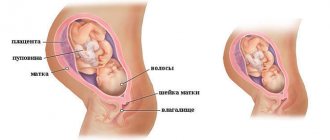Body changes and new sensations for women
At this stage, a long-awaited event occurs, which the woman has been dreaming about for 15 weeks - now she can finally feel the first movements of the fetus during pregnancy.
There are, however, some nuances here. Thus, primiparous women feel the tremors later than multiparous women, and thin pregnant women feel the shocks “in the body” earlier than mothers. Therefore, the absence of movements at week 16 is not yet a cause for concern. You may have to wait until week 22, which is also normal. As for the health of the expectant mother, in the second trimester a woman may be bothered by leg cramps - this is due to the increasing needs of the growing fetus for various nutrients and microelements. If unpleasant symptoms occur (cramps during pregnancy most often appear at night), you need to pull your toes towards you. Massage of the calf muscles and feet is also a good preventative measure. To restore blood circulation in the legs, movements must be done only in an ascending line.
Possible complications and risks
Fever and colds
The norm at the 16th week of pregnancy is a slightly elevated temperature, up to +37. The body still works in an intense mode, for two - mother and child, so the temperature rise is natural. When its indicator exceeds +37, a runny nose, cough, weakness are added to this, we are talking about colds. They require immediate treatment.
Important! Self-medication of any kind during pregnancy is strictly prohibited! Any medications can only be taken with the prior permission of the doctor
Frozen pregnancy and threatened miscarriage
The risk of interruption of fetal development in the mother's belly at 16 weeks of pregnancy is still high.
Unfortunately, it is often not possible to determine the exact cause of a missed abortion.
It can be triggered by any of the following factors:
- Rh conflict between child and mother;
- genetic abnormalities and mutations;
- infectious infections;
- hormonal problems, especially lack of progesterone;
- bad habits, unhealthy lifestyle of the mother;
- previous abortions.
A frozen pregnancy is extremely dangerous for a woman’s health and life. The most important thing is to detect it in time. There is no need to ignore these body signals:
- Fever, general weakness;
- nagging pain in the lower abdomen;
- copious vaginal discharge that is bloody or dark brown in color.
Sometimes fetal freezing does not manifest itself at all. This is where ultrasound and a blood test for hCG come to the rescue. If it shows a sharp decrease in hormone levels, and an ultrasound confirms the fact of a frozen pregnancy, the woman will be subject to hospitalization and surgery to remove the fetus.
ICI (isthmic-cervical insufficiency)
This complex name hides the phenomenon when the cervix shortens so much that it becomes unable to hold the fetus. If it falls out at 16 weeks, it is a guaranteed miscarriage. Detection of such a pathology of the cervix requires urgent surgical intervention, otherwise it may be too late and the fetus will die.
IUGR (intrauterine growth restriction)
Sometimes an ultrasound shows that the fetus is developing much more slowly than it should at a given time. In medical language, this is called intrauterine growth restriction (IUGR). The basis for it is a deviation from the norm of more than 10%.
Panic right away is the last thing to do, since, according to statistics, such a preliminary diagnosis is more often made incorrectly. Insufficient size and weight do not always mean ZVIR. Now the time has come for doctors to show their knowledge and figure out the correct diagnosis.
If the fetus is confirmed to have a fetal breast cancer, the cause of the pathology may be genetic abnormalities or infections. Perhaps the fetus will soon catch up. If the pathology persists until the end of pregnancy, there is a high risk that the child will be born with external or internal defects.
Mom's belly
At 16 weeks of pregnancy, the fundus of the uterus is located exactly in the middle between the navel and the pubic symphysis. Starting from this period (for multiparous women, perhaps a little earlier), the gynecologist will regularly measure the height of the uterus and the circumference of the woman’s abdomen.
It is impossible to say exactly what the tummy should be like at 16 weeks. Doctors measure its growth over time; this indicator is considered the most informative in medicine.
The expectant mother's stomach may still hurt. Unfortunately, pain in the abdominal cavity inevitably accompanies an “interesting position.” If such symptoms become strong and regular, you should consult a doctor (unpleasant sensations, for example, may be a sign of increased uterine tone during pregnancy).
What happens to the mother's body at 16 weeks of pregnancy
Four more weeks and you will be exactly halfway through your pregnancy. Are you getting enough rest and sleep? During pregnancy, doctors recommend sleeping on your side.
Sleeping on your stomach can be uncomfortable in the 16th week of pregnancy, and sleeping on your back increases pressure on the vena cava, the blood vessel that carries blood to the heart, according to experts.
Sleeping on the left side improves blood circulation, stimulates blood flow to the fetus, uterus and kidneys. To make yourself more comfortable, try placing one pillow between your knees and another under your stomach. If you have trouble finding a comfortable sleeping position, talk to your doctor.
Between 16 and 20 weeks or later, you may feel your baby move for the first time. Don't worry if you don't feel any movement yet. Your baby is still very young, and every pregnancy feels unique.
The baby is not moving so actively yet, so it may be difficult for the mother to understand what exactly is causing her sensations in the stomach: the baby’s movements, gases, or the rumbling of an empty stomach.
Tests and ultrasound
An ultrasound scan at 16 weeks of pregnancy is not routinely performed. However, if the doctor suspects that the fetus is developing somehow incorrectly, at this time he may suggest that the woman undergo a repeat ultrasound and amniocentesis. Today, amniocentesis is considered one of the most accurate genetic tests for malformations and various chromosomal abnormalities of the fetus, such as Down syndrome and Edwards syndrome (the probability of a correct result is about 80.8%). To conduct the study, the woman’s amniotic fluid is taken for analysis, in which the baby’s cells are identified.
Amniocentesis is an unsafe procedure and is associated with certain risks (sometimes puncturing the amniotic sac can cause a miscarriage). In some developed countries, invasive prenatal research involving penetration into the female body is generally prohibited - many believe that this is very cruel to the unborn child, since genetic tests are often followed by abortions.
Intimate relationships
Sexual contacts between spouses are called intimate relationships because they resolve all issues related to sex without outside interference. At this stage of pregnancy, marital sex does not require any restrictions other than the threat of miscarriage, multiple pregnancies, and low placenta previa. With low presentation, the placenta does not cover the entrance to the cervical canal and is fixed at a short distance from it. Any pressure on the uterus or sexual arousal is dangerous, as it provokes placental abruption and massive bleeding.
Nutrition at 16 weeks of pregnancy
Did you know that cramps that occur during an “interesting position” are primarily associated with poor nutrition? We'll talk about vitamins and mineral supplements below, but for now, pay attention to how often and in what quantities you eat. If food is taken rarely, but in large quantities, a woman does not have breakfast, and at the same time has a heavy dinner, her blood sugar level may drop, which in some cases is the cause of leg cramps during pregnancy.
It is also unnecessary to remind you that proper nutrition during an “interesting situation” means varied, high-quality and fresh food without fast food, canned food and caffeinated drinks.
Pregnancy calendar 16 week
The growth of the fetus at the 16th week of pregnancy reaches 17 centimeters, and the weight is about 120 grams, the perimeter of the skull is 10 centimeters, the chest circumference is 9.9 centimeters, and the abdominal cavity is 9.6 centimeters. The sacro-parietal size is 12 centimeters. The volume of amniotic fluid is about 250 milliliters. The child is actively moving. His limbs are increasingly lengthened, this occurs with the simultaneous development of the muscular system. To form bones, the fetus requires a lot of calcium, and if there is not enough of it in a woman’s diet, calcium begins to be removed from the mother’s body. By regularly performing flexion-extension movements in the elbow, knee and hip joints, the child trains muscles and prepares for life outside the fetal fluid.
This week the fetus can already hold its head straight. The child’s facial muscles are fully formed and he has rich facial expressions. However, grimaces, squinting, wrinkling of the forehead, smiling and sticking out the tongue are involuntary. The baby's skin is thin without fatty tissue. The development of hair follicles on the head and body, as well as the growth of nail plates, continues. Pronounced external genitalia make it possible to determine the sex of the fetus using ultrasound. The girl has already had her ovaries descend from the abdominal cavity into the pelvic area.
The baby's kidneys continue to function actively. Urine is regularly released into the amniotic fluid. Transferring part of the excretory function to the kidneys reduces the load on the placenta. At the 16th week of pregnancy, liver function increases. The bile it produces enters the intestines and will remain there until the first spontaneous bowel movement, which will occur shortly after birth.
Although the elements of the ear responsible for receiving sound have not yet fully formed, the fetus reacts to sound. If there is a loud, sharp sound, he may flinch. The child also distinguishes low tones. Scientists suggest that this reaction is due to bone sensitivity.
At the 16th week of pregnancy, an improvement in the hematopoietic system is noted. Before this period, fetal hemoglobin was present in the fetal blood, characteristic only for the period of intrauterine development. This week, the formation of normal hemoglobin begins in the fetal blood.
The cardiovascular system works regularly. Pumping blood throughout the fetal body is carried out by a four-chambered heart. Blood supplies organs and systems with oxygen and nutrients, and also removes carbon dioxide and products formed as a result of metabolism.
The child’s functioning of the endocrine glands improves. The adrenal glands have learned to produce hormones and now contribute to the overall hormonal balance.
To ensure proper metabolism and gas exchange processes between mother and fetus, supplying both organisms with hormones, the mother-placenta-fetus system functions intensively.
At 16 weeks of pregnancy, a woman's uterus continues to enlarge, which is required to accommodate the growing fetus. In some women (usually with repeated pregnancies), at this stage the mammary glands begin to work and colostrum is formed. The weight of the expectant mother increased by 2.5-3 kilograms compared to prenatal. The belly begins to round, the waist disappears, and the pigmentation of the nipples and areola increases. Hormonal processes occurring in the mother’s body are “to blame” for the appearance of age spots on the body and face.
The time has come for the next analyzes and tests. The woman will have an AFP test to determine the amount of alpha-fetoprotein secreted by the fetus. This analysis helps to identify possible deviations in the child's development. Elevated levels of AFP can signal a disorder in the formation of the spinal cord (“spina bifida”). A low level of alpha-fetoprotein in combination with increased hCG syndrome is a symptom of downism or hydrocephalus. In any case, a thorough examination of the fetus is prescribed to confirm these diseases. Screening for Down syndrome requires a “triple” test, which includes AFP, hCG and estriol. The statistics are as follows: deviations from the norm during the “triple” test are detected in 50 women out of 1000. And only in 1-2 cases, further research confirms fetal malformations.
Lifestyle
If worries and fears about pregnancy still haunt you, now is the best time to take up yoga. It is believed that yoga for pregnant women is a set of the most gentle and safe physical exercises for expectant mothers. Special positions (asanas) help cope with feelings of anxiety and relieve emotional stress. During classes, a woman learns to control her breathing, relaxes, “unloads” the spine and... communicates with other expectant mothers, which is also important.
Risk factors
If pregnancy develops without pathologies and complications, there should not be any particular unpleasant sensations at this stage. With prolonged physical activity, you may experience pain in the lower back or legs, but in no case in the lower abdomen.
At the 16th week of pregnancy, the risk of developing iron deficiency anemia increases. This is due to an increase in the volume of circulating blood and a decrease in the number of red blood cells in it. To compensate for iron deficiency, the gynecologist may prescribe medications containing this element. Also, in the blood of the expectant mother, when the period has reached 16 weeks of pregnancy, a lack of calcium and magnesium is often detected, which is fraught with the appearance of cramps in the legs (most often at night). In this situation, special magnesium preparations will help, and to replenish the daily need for calcium, it is enough to eat a little cottage cheese and drink a glass of kefir or milk every day.
Discharge at 16 weeks of pregnancy is white or yellowish and practically odorless. When they cause itching, have a strong odor and turn green, these may be symptoms of a genital infection that must be treated. And if the discharge turns brown, pink or red, this is a cause for serious concern. In combination with cramping pain, a feeling of tightness in the lower back and a “petrified” abdomen, they can be a sign of uterine hypertonicity. Take a lying position and immediately call an ambulance.
Beauty and accessories
Every week a woman's belly becomes bigger and bigger. Worried that new sizes will make you less attractive? Don't worry: maternity clothing manufacturers follow fashion trends, so you'll always look stylish if you want. Pay attention to movie and show business stars: many of them do not hide their belly; on the contrary, they emphasize it, choosing tight models even during an “interesting position.” Follow their example, don’t hide your changed status, be proud of it, because very soon you will become a mother!
Feel
Feelings at the 16th week of pregnancy, if it proceeds favorably and in accordance with all norms, are not overshadowed by any painful or unpleasant manifestations. Toxicosis is a thing of the past, and so is frequent urination. The breasts, preparing for lactation, continue to enlarge, but the pain, as a rule, already disappears. Against this background, the expectant mother seems to “come to life”: the hormonal background has established itself in comparison with the early stages of pregnancy, therefore the woman becomes balanced and calmer, full of new strength and joy.
Starting from the 16th week of pregnancy, a woman often begins to feel her appetite increase. This is especially true for those mothers who initially suffered from toxicosis: now is the time to catch up on “lost time” and eat tasty and nutritious food, but at the same time keeping an eye on your weight.
It’s surprising, but at the same time pleasant, that the sensations at 16 weeks of pregnancy can be enriched by the first movements of a very tiny baby. Women who are pregnant again are more likely to feel the first movements of the baby: fetal movements in this case often occur 2-4 weeks earlier than during the first pregnancy. Often, the expectant mother at first does not even realize that these were the very first tangible movements of her beloved child: many women compare them with a slight flutter or sensation from air bubbles.
But, even if mommy listens sensitively to her feelings, but still doesn’t feel any movements, you shouldn’t be upset about this. After all, some mothers have a more active baby, some have a calmer one, even in the same woman, in different pregnancies, the babies begin to noticeably move differently.
Ultrasound
But, even if the woman does not yet feel the movements of the fetus, she can observe them during an ultrasound at the 16th week of pregnancy. When conducting an ultrasound examination, you can clearly see on the monitor how the baby moves, and even complements his movements with active grimacing. An ultrasound at the 16th week of pregnancy will show: the baby’s facial expressions are unusually active - the baby is already frowning, grimacing, winking. And, besides, it becomes clear who is “making faces” in the mother’s tummy: an ultrasound at 16 weeks of pregnancy is quite capable of determining the sex of the baby.
Fetal movement at sixteen weeks
By the 16th week, most expectant mothers have already experienced the sensations associated with the first movement of the fetus. Basically, these are still quite weak, barely perceptible tremors that appear when the baby is especially active. Such tremors intensify if a woman experiences fear or is in a stressful situation. The fetal movement is most noticeable at night, when her body is completely relaxed.
Also, if there is no movement in the sixteenth week of pregnancy, there should be no reason to panic. The fact is that every woman has individual characteristics of her body, and every expectant mother develops her child differently. For some, already at 14-15 weeks it begins to behave more than actively and clearly manifest its presence, for others it does not.
If an ultrasound of the fetus, performed at 13-15 weeks, did not show any abnormalities in its development, there is no need to worry about the lack of motor activity. In this case, most likely the expectant mother simply does not feel his pushes yet. She will definitely experience a similar feeling a little later.
It is necessary to contact a specialist if sensations of fetal movement have already occurred, but have suddenly stopped. A decrease in the child’s motor activity may indicate oxygen starvation, as well as a very dangerous condition - frozen pregnancy at 16 weeks. Such a diagnosis means a sudden cessation of development and death of the fetus. Experts have not yet fully figured out why this happens.









